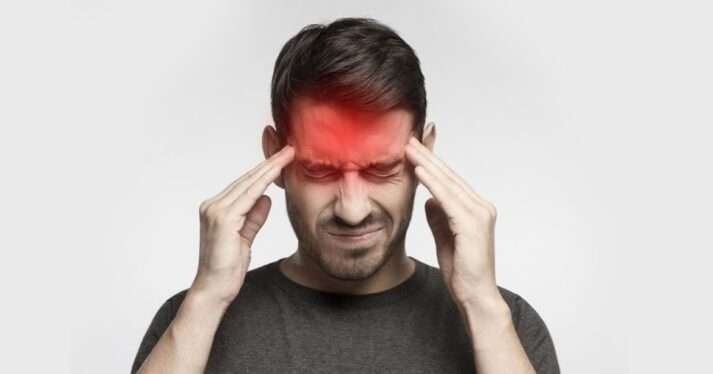
If you suffer from migraine, you know how disabling it can be. This Ayurvedic guide explains what a migraine is, the problem, common triggers, and safe natural remedies — herbs, diet, breathing practices and lifestyle changes — to reduce frequency and intensity. If attacks persist, get an expert consultation for a personalised plan.
The problem
A migraine is more than a bad headache. The main problem is recurring, often one-sided head pain with sensitivity to light, sound or smell. In Ayurveda, migraine commonly links to Vata and Pitta imbalance plus accumulation of ama (toxins) and aggravated rakta (blood) or meda (fat). Left unchecked, migraine affects sleep, work and mood. Simple painkillers may help short-term but do not address the root causes that Ayurveda targets.
What is migraine?
Migraine is a neurological condition characterised by moderate-to-severe throbbing or pulsating pain, often accompanied by nausea, vomiting, visual aura, or sensitivity to light and sound. Attacks can last hours to days. Triggers include sleep disruption, stress, certain foods, dehydration and hormonal changes.
Common triggers (identify yours)
- Stress and irregular sleep schedule.
- Skipping meals or low blood sugar.
- Certain foods (aged cheese, excess caffeine, processed foods).
- Bright lights, loud noise, strong smells.
- Hormonal shifts in women.
Tracking triggers helps reduce attacks — keep a simple diary to spot patterns.
Ayurvedic approach to migraine
Ayurveda treats migraine by calming Vata and Pitta, improving digestion (agni), removing ama, and strengthening ojas (vitality). Treatment combines topical therapies, internal herbs, diet shifts, routine, and stress-management techniques. The aim is fewer attacks, milder intensity, and quicker recovery.
10 Ayurvedic & natural remedies for migraine
- Abhyanga (warm oil head & scalp massage)
- Use warm sesame or brahmi oil.
- Gently massage the scalp and neck for 7–10 minutes to calm Vata and improve circulation.
- Nasya (medicated nasal drops)
- A few drops of Anu taila or medicated oil into nostrils can clear head channels and reduce frequency.
- Start under practitioner guidance.
- Brahmi & Ashwagandha
- Brahmi supports the nervous system and memory. Ashwagandha reduces stress.
- Use standardized formulations as advised.
- Triphaladi / Shankhapushpi formulations
- Classic Medhya (mind-supporting) herbs that soothe the nervous system and reduce aura and tension.
- Ginger tea for acute relief
- Fresh ginger boiled in water reduces nausea and has mild anti-inflammatory effects during an attack.
- Cold compress on the forehead and temples
- Apply a cool cloth to reduce throbbing pain and calm Pitta-related heat.
- Regular pranayama & calming meditation
- Bhramari (bee breath), deep diaphragmatic breathing and short guided meditation reduce stress-triggered migraines.
- Diet adjustments (avoid triggers)
- Skip aged, fermented, processed or overly spicy foods.
- Eat small, regular meals with fresh, warm foods and use digestive spices: cumin, coriander, ajwain.
- Hydration & magnesium-rich foods
- Dehydration can trigger migraine. Include water, coconut water and magnesium sources like pumpkin seeds and leafy greens.
- Sleep routine and lifestyle balance
- Maintain consistent sleep-wake times.
- Limit screen time before bed. Regular moderate exercise helps regulate hormones and circulation.

How to use these remedies safely
- Start with lifestyle and diet changes first.
- Use herbs and Nasya under an Ayurvedic practitioner, especially if pregnant, nursing, or on medication.
- Keep a migraine diary: date, duration, intensity, possible trigger, remedies tried and outcome.
When to get urgent medical help
Seek immediate care if you experience: sudden severe headache unlike previous migraines, weakness on one side, slurred speech, high fever with stiff neck, confusion, loss of vision, or seizure. These may indicate serious conditions needing emergency attention.
When to get an Ayurvedic consultation
If migraines are frequent (more than 4 per month), last long, interfere with life, or medicines cause side effects — consult an expert. For a personalised Ayurvedic treatment plan (diet, Nasya, Rasayanas, and panchakarma options) and coordinated care, get a consultation from Vedic Upchar: https://vedicupchar.com/doctor-consultation. A tailored plan reduces attacks and improves quality of life.
Quick daily routine to reduce migraine risk
- Morning: warm water, light stretching, 5 minutes pranayama.
- Day: small regular meals, stay hydrated, avoid known food triggers.
- Evening: gentle oil massage (light), limit screens before bed.
- Weekly: 2–3 sessions of guided relaxation or meditation.